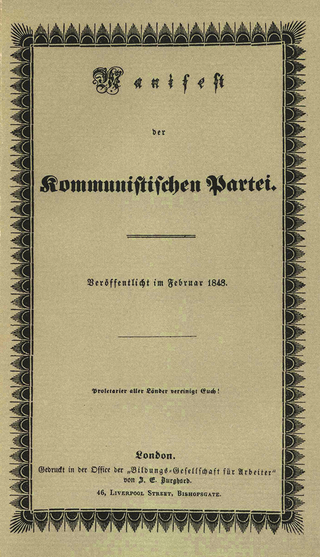
The Communist Manifesto, originally the Manifesto of the Communist Party, is a political pamphlet written by Karl Marx and Friedrich Engels, commissioned by the Communist League and originally published in London in 1848. The text is the first and most systematic attempt by Marx and Engels to codify for wide consumption the historical materialist idea that "the history of all hitherto existing society is the history of class struggles", in which social classes are defined by the relationship of people to the means of production. Published amid the Revolutions of 1848 in Europe, the manifesto remains one of the world's most influential political documents.

Anti-capitalism is a political ideology and movement encompassing a variety of attitudes and ideas that oppose capitalism. In this sense, anti-capitalists are those who wish to replace capitalism with another type of economic system, such as socialism or communism.

In Marxist philosophy, commodity fetishism is the perception of the economic relationships of production and exchange as relationships among things rather than among people. As a form of reification, commodity fetishism presents economic value as inherent to the commodities, and not as arising from the workforce, from the human relations that produced the commodity, the goods and the services.
Labour power is the capacity to do work, a key concept used by Karl Marx in his critique of capitalist political economy. Marx distinguished between the capacity to do work, i.e. labour power, and the physical act of working, i.e. labour. Labour power exists in any kind of society, but on what terms it is traded or combined with means of production to produce goods and services has historically varied greatly.

Abstract labour and concrete labour refer to a distinction made by Karl Marx in his critique of political economy. It refers to the difference between human labour in general as economically valuable worktime versus human labour as a particular activity that has a specific useful effect within the (capitalist) mode of production.

Criticism of capitalism is a critique of political economy that involves the rejection of, or dissatisfaction with the economic system of capitalism and its outcomes. Criticisms typically range from expressing disagreement with particular aspects or outcomes of capitalism to rejecting the principles of the capitalist system in its entirety.

Krisis is an anti-political German political magazine and discussion group formed in 1986 as a "theoretical forum for a radical critique of capitalist society." Its members includes Robert Kurz, Roswitha Scholz, Nobert Trenkle, Ernst Lohoff, Achim Bellgart and Franz Schandl.
"Wage Labour and Capital" was an 1847 lecture by the critic of political economy and philosopher Karl Marx, first published as articles in the Neue Rheinische Zeitung in April 1849. It is widely considered the precursor to Marx’s influential treatise Das Kapital. It is commonly paired with Marx's 1865 lecture Value, Price and Profit. Previously, Marx had been studying political economy; evidence of this being his unpublished Economic and Philosophic Manuscripts of 1844 and The Poverty of Philosophy in France in 1847.

Capital. A Critique of Political Economy. Volume I: The Process of Production of Capital is the first of three treatises that make up Das Kapital, a critique of political economy by the German philosopher and economist Karl Marx. First published on 14 September 1867, Volume I was the product of a decade of research and redrafting and is the only part of Das Kapital to be completed during Marx's life. It focuses on the aspect of capitalism that Marx refers to as the capitalist mode of production or how capitalism organises society to produce goods and services.
Marxian class theory asserts that an individual's position within a class hierarchy is determined by their role in the production process, and argues that political and ideological consciousness is determined by class position. A class is those who share common economic interests, are conscious of those interests, and engage in collective action which advances those interests. Within Marxian class theory, the structure of the production process forms the basis of class construction.

Robert Kurz was a German philosopher, social critic, journalist and editor of the journal Exit! He was one of Germany's most prominent theorists of value criticism.
In Marxist theory and Marxian economics, the immiseration thesis, also referred to as emiseration thesis, is derived from Karl Marx's analysis of economic development in capitalism, implying that the nature of capitalist production stabilizes real wages, reducing wage growth relative to total value creation in the economy. Even if real wages rise, therefore, the overall labor share of income decreases, leading to the increasing power of capital in society.
In the Marxist theory of historical materialism, a mode of production is a specific combination of the:
Exploitation is a concept defined as, in its broadest sense, one agent taking unfair advantage of another agent. When applying this to labour, it denotes an unjust social relationship based on an asymmetry of power or unequal exchange of value between workers and their employers. When speaking about exploitation, there is a direct affiliation with consumption in social theory and traditionally this would label exploitation as unfairly taking advantage of another person because of their vulnerable position, giving the exploiter the power.
In Karl Marx's critique of political economy and subsequent Marxian analyses, the capitalist mode of production refers to the systems of organizing production and distribution within capitalist societies. Private money-making in various forms preceded the development of the capitalist mode of production as such. The capitalist mode of production proper, based on wage-labour and private ownership of the means of production and on industrial technology, began to grow rapidly in Western Europe from the Industrial Revolution, later extending to most of the world.
Value criticism is a social theory which draws its foundation from the Marxian tradition and criticizes the contemporary mode of production. Value criticism was developed partly by critical readings of the traditions of the Frankfurt School and critical theory. Prominent adherents of value criticism include Robert Kurz, Moishe Postone and Jean-Marie Vincent.

Capital: A Critique of Political Economy, also known as Capital and Das Kapital, is a foundational theoretical text in materialist philosophy and critique of political economy written by Karl Marx, published as three volumes in 1867, 1885, and 1894. The culmination of his life's work, the text contains Marx's analysis of capitalism, to which he sought to apply his theory of historical materialism "to lay bare the economic law of motion of modern society", following from classical political economists such as Adam Smith and David Ricardo. The text's second and third volumes were completed from Marx's notes after his death and published by his colleague Friedrich Engels. Das Kapital is the most cited book in the social sciences published before 1950.
Marxian economics, or the Marxian school of economics, is a heterodox school of political economic thought. Its foundations can be traced back to Karl Marx's critique of political economy. However, unlike critics of political economy, Marxian economists tend to accept the concept of the economy prima facie. Marxian economics comprises several different theories and includes multiple schools of thought, which are sometimes opposed to each other; in many cases Marxian analysis is used to complement, or to supplement, other economic approaches. Because one does not necessarily have to be politically Marxist to be economically Marxian, the two adjectives coexist in usage, rather than being synonymous: They share a semantic field, while also allowing both connotative and denotative differences. An example of this can be found in the works of Soviet economists like Lev Gatovsky, who sought to apply Marxist economic theory to the objectives, needs, and political conditions of the socialist construction in the Soviet Union, contributing to the development of Soviet Political Economy.
Marxist philosophy or Marxist theory are works in philosophy that are strongly influenced by Karl Marx's materialist approach to theory, or works written by Marxists. Marxist philosophy may be broadly divided into Western Marxism, which drew from various sources, and the official philosophy in the Soviet Union, which enforced a rigid reading of what Marx called dialectical materialism, in particular during the 1930s. Marxist philosophy is not a strictly defined sub-field of philosophy, because the diverse influence of Marxist theory has extended into fields as varied as aesthetics, ethics, ontology, epistemology, social philosophy, political philosophy, the philosophy of science, and the philosophy of history. The key characteristics of Marxism in philosophy are its materialism and its commitment to political practice as the end goal of all thought. The theory is also about the struggles of the proletariat and their reprimand of the bourgeoisie.
Historical materialism is Karl Marx's theory of history. Marx located historical change in the rise of class societies and the way humans labor together to make their livelihoods.






